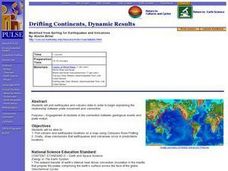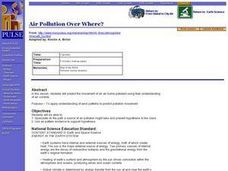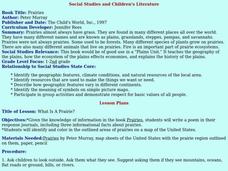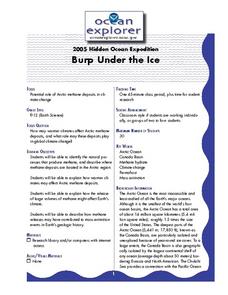Curated OER
Drifting Continents, Dynamic Results
Students plot earthquake and volcano data using a Compass Rose Plotting. They explain the relationship between plate movement and connection. They draw conclusions that earthquakes and volcanoes occur in predictable locations.
Curated OER
Daily Edits: Water
For this sentence correction worksheet, students read the sentences and rewrite them by editing them with corrections. Students complete 4 examples.
Curated OER
Frozen Film
Learners are introduced to the topic of light interference through this hands-on activity. They observe how light reflects off two surfaces and then meets to form an interesting variation of color on a film surface.
Curated OER
Three Cold Realms
Students identify organisms within the realms of pelagic, benthic and sea ice. They explain how these three interact with each other.
Curated OER
How To Save The Planet
Students work together in groups to create a book about how to save the environment. They are to research ways to help the environment and assemble them into the book. They can even design a cover if they choose.
Curated OER
Air Pollution Over Where?
Students predict the movement of an air borne pollutant using their understanding of air currents. They determine which governments and/or communities should be contacted to be forewarned. They also explore the properties of their...
Curated OER
Introduction to the United States Map
Students identify the United States of America and it's states on a map. In this mapping lesson, students examine a globe and find the United States as well as a few land marks (Florida and the Great Lakes). Students then look at a...
Curated OER
Landforms All Around
Students create a "Landform Dictionary". They develop an overlay map and participate in hands-on activities to identify the key characteristics of landforms. They discuss the plant and animal life of these areas. Handouts for the lessons...
Curated OER
Discoverers and Explorers
In this discoverers and explorers worksheet, students read short paragraphs about Christopher Columbus, Magellan, Sir Francis Drake and Walter Raleigh.
Curated OER
Tooling Around Arizona: Reading Arizona Maps
Students study geography. In this Arizona maps lesson, students develop their map reading skills. They have class discussions and work independently with various copies of Arizona maps to practice those skills. This lesson mentions...
Curated OER
Noah's Ark, Revisited
Fourth graders do a visual presentation for a specific endangered species.
Curated OER
Water and Land 207
Students examine maps of different projections, mathematically calculate distortions, and note the advantages and disadvantages of each map. They study the different maps and transfer the map to graph paper.
Curated OER
Earth: the Apple of Our Eye
Pupils dissect an apple to model the percentage of land on Earth that can be used as a food-producing resource. They use fractions to determine the habitable and agriculture area of the apple.
Curated OER
Social Studies and Children's Literature
Young scholars write a journal in response to literature. The story that is read is about prairies. The subject of prairies becomes an object for research. The culminating activity is the making of a map where prairies exist in the...
Curated OER
Mechanics Help Using the Comma with Formal Letters
In this worksheet, students analyze different parts of a letter and insert the appropriate punctuation including a comma, period, colon, question mark and semicolon.
Curated OER
Continents
For this continents worksheet, students use clues from a song titled "Continents" and match to the correct continent. A link to the song or information for obtaining is not given.
Curated OER
FILLING IN THE GAPS - Acquiring and Analyzing Satellite and Ground-Based Data
Young scholars monitor rainfall, compute daily averages, and compare their methods of computation to those used by actual researchers using satellite observations.
Curated OER
Ambush Warriors
Middle schoolers identify four different categories of reptiles and explain how snakes deliver their venom to their prey.
Curated OER
Regions of South America
Students explore facts about South America in the four lessons of this unit. Booklets are created from the materials produced as the class delves into the topic.
Curated OER
Jelly Critters
Students compare and contrast three different organisms that are considered gelatinous zooplankton. They describe how they fit into marine food webs.
Curated OER
Where Have All the Glaciers Gone?
Pupils examine how climate change is affecting sea ice, vegetation and glaciers in the Arctic region.
Curated OER
Burp Under the Ice
Students examine the impact of climate warming on Arctic methane deposits. They identify natural methane processes and describe how this contributes to species extinction. They write reports on their findings.
Curated OER
Getting to the Bottom
Students identify taxa in Arctic benthic communities. They discover organisms that live in these Arctic areas. They analyze data compiled for the Canada Basin Benthic Samples, 2002.
Curated OER
2005 Hidden Ocean Expedition What's Eating You?
Analyze data and make inferences about the trophic position of organisms in the Canada marine food web. After a review of the geography and formula, discuss results and write an essay to improve the understanding of Artic food webs.


